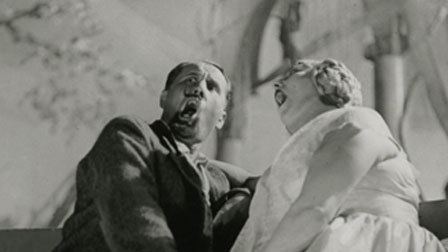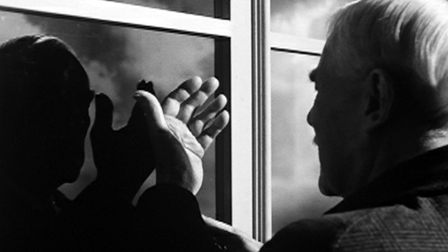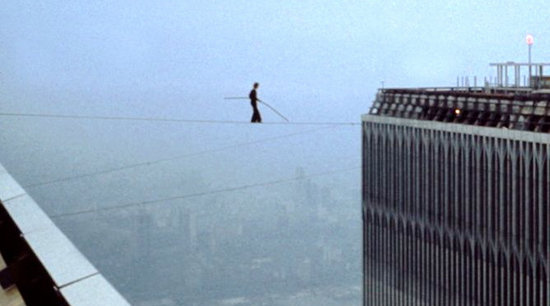I normally don't blog about the movies I watch—between my reading and knitting blogs I feel I need one part of my life that's not being documented—but when I saw Richard's Orbis Terrarum Film Mini-Challenge I thought it would be fun to spread a little foreign film love. And at this point I've been "thinking" about writing a post for the mini-challenge for so long that I've accumulated quite the little list! Let's get started.
Le million

First up is an extremely silly but nonetheless enjoyable early French talkie: René Clair's 1931 Le million. The ridiculous plot (a starving artist type, beset by creditors, suddenly finds that his lottery ticket has won a million francs, only to realize he's lost said ticket, spurring hijinks galore including run-ins with the police, organized crime, a sulky society miss and a famous tenor) is accented by spontaneous song-and-dance numbers in which random citizens of Paris bewail the loss of such inspiring sums. As an aside: this film is a surprisingly effective tool for those trying to learn beginning French; there's even one scene where all of the main character's creditors file up a stairway, with another character labeling them by profession: "Le boucher! L'épicier!" Silliness aside, the real interest here for film buffs comes in seeing some of the experimental uses filmmakers were finding for this new addition of "sound"; in one fight scene, for example, the actual noises made by the characters are replaced by the cacophany of a football match. A goofy romp from another era, which was charming and old-timey enough to get away with being over-the-top.
Wild Strawberries

Next up is a very different film: Ingmar Bergman's 1957 Wild Strawberries. This dark, quiet day-in-the-life tale follows an octogenarian professor who wakes up from a troubling dream on the morning he is supposed to receive an important award; he spends the next eighteen hours coming to the realization, not only that he is on the verge of death, but that he has spent his life being awful to everyone around him, having ruined, in particular, his own marriage and the life of his son. Bergman's storytelling, in dreamy black-and-white, is undeniably compelling—even the techniques that have since become filmmaking clichés, like the main character's dream sequence involving getting pulled into a coffin by his own dead body, read as surprisingly vital. I was impressed by the film, but I must admit that the really compelling thing about this disk (the Criterion Collection edition) is a special feature: an interview with Bergman conducted sometime in the 1970s. I was surprised to find that I deeply identify with what this Swedish director had to say. One remark that I remember in particular had to do with his identity as a craftsman: he wanted to make solid objects that were concretely useful to the people who knew them. As a craftsperson myself, I love this outlook on art: it's not some enervated "extra" of no real value to life, but a solid, utilitarian object, like a chair or a toilet. It's not that people "can't live without" art; people can live without chairs and toilets, too. But the presence of art has a concrete benefit; I appreciated Bergman's reminder of that.
Babies

My next selection is still playing in theaters: Thomas Balmès's 2009 documentary Babies is French, but you wouldn't know it until the very end, because it's almost completely non-lingual. Balmès and his crew simply follow the lives of four babies—growing up respectively in ultra-urban Tokyo, brownstone-y San Francisco, a village in Namibia and the plains of Mongolia—from birth to about eighteen months. I will state for the record that I'm not really a "baby person," but I nevertheless found this film totally engaging: the cultural differences are interesting, as are the developmental similarities, but I felt the film's real accomplishment is in capturing small moments of struggle or triumph. An extended scene in a playroom, in which Mari (the Japanese baby) teeters between wonder and abject meltdown while trying to operate her toy, for example, or the tragic moment when Hattie (the American baby) takes a bite out of the wrong side of a banana. There is so much comedic storytelling in these small moments, and it's quite an accomplishment to pack it all in while using essentially no words. Not to mention, the cinematography is absolutely stunning: the footage of the Mongolian plains had me checking visa requirements and weather conditions. Seriously, see the still above. Gorgeous.
Man on Wire

Lastly, Richard reminded me that I'd been meaning to take in Man on Wire, a BBC documentary about Frenchman Philippe Petit, the high-wire artist who covertly strung a wire between the two towers of the World Trade Center in New York City in 1979, and danced across it and back for 45 minutes. (If this sounds familiar, it's the factual basis on which Colm Toibin's Let the Great World Spin is built.) This documentary is, indeed, wildly entertaining, and even as I remarked to myself how impossibly intense and sometimes unpleasant Petit seemed from a human point of view, I was incredibly inspired by his story from an artistic perspective. Glimpsing a photograph of the planned World Trade Center towers, he felt an all-consuming calling to wire-walk between them—and by all accounts, from that moment until he accomplished his mission he never wavered in his dedication to this goal. Yes, this makes him seem a little crazy, but it also very much reinforces the value of art—none of the people involved, even those who had subsequently broken with Petit or been spurned by him, ever questioned how beautiful and moving it was to watch him dance on air that morning in 1979. Americans often ask him why he did it, but he seems puzzled trying to answer this question; he does what he does because his art is simply his mode of existence. A great, entertaining and thought-provoking two hours.


The first two are all-time favorites of mine. I should see the other two, I guess!
You might really love The Cave of the Yellow Dog (on instant watch at http://www.netflix.com/Movie/The-Cave-of-the-Yellow-Dog/70058949?strackid=304ec25579bdfec5_0_srl&strkid=1294486824_0_0&trkid=222336) about a family in Mongolia. Very slow, beautiful, fascinating...
You might love The Cave of the Yellow Dog (http://www.netflix.com/Movie/The-Cave-of-the-Yellow-Dog/70058949?strackid=304ec25579bdfec5_0_srl&strkid=1294486824_0_0&trkid=222336) about a family in Mongolia. Beautifully slow movie about an amazing landscape.
I have not seen any of these movies. Now I will have to add them all to my Netflix queue. I'm not a baby person either but you are right, the still of the toddler on the plains is breathtaking.
I'm a baby person for short spans of time, so I think I could be made to coo over babies for a couple of hours worth of documentary. :p
Ack just lost my last comment. I'll try again.
I'm really looking forward to seeing the BABIES movie. And I am a babies person. Available from netflix starting next week!
I'll have to find the other movies. I've enjoyed most of the foreign movies I've seen.
Ingmar Bergman is another fellow on my list of "need to watch" directors. I like that bit you quoted from the interview - such a beneficial way of thinking about art. I'll have to see what I can find by him in the near future.
Thanks for this post! You know how much I love movies - it's so fun to see what others are watching. :)
Amateur Reader: Wow, interesting! I was not expecting someone to say that about Le million, but I can see how it could become dear to a person's heart.
LifetimeReader: Cave of the Yellow Dog looks just beautiful; thanks so much for the recommendation!
Stefanie: Yes, I was surprised how much I got out of the film despite not reacting to so-called "baby porn." :-) Lovely filmmaking & storytelling.
Jenny: I'd recommend it, then! There are some pretty hilarious scenes.
Rebecca: If you are a baby person, I can think of absolutely nothing about Babies that you could possibly fail to enjoy. Unless you're sensitive about unsanitary conditions, I suppose. But really, nothing very bad happens to any of the babies, so there's nothing to worry about. :-)
Sarah: I do know how much you love movies! I was thinking of your monthly movie posts when I did this little wrap-up. I don't feel like I have a "handle" on Bergman yet, having only seen one film of his, but I'll definitely be checking out more of his films in future.
I really liked your comments on the Ingmar Bergman interview, and I quoted you on my blog. I hope you don't mind, please let me know if you do! I've just discovered your blog lately and have been enjoying it, so hi!